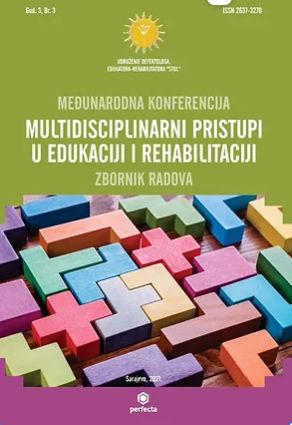PRISTUPAČNOST USLUGA SPECIJALNIH EDUKATORA I REHABILITATORA ZA VRIJEME PANDEMIJE COVID-19 IZ PERSPEKTIVE RODITELJA
ACCESSIBILITY OF SERVICES OF SPECIAL EDUCATORS AND REHABILITATORS DURING THE COVID-19 PANDEMIC FROM THE PERSPECTIVE OF PARENTS
Author(s): Slađana Ćalasan, Bojana Mastilo, Bojana Vuković, Ivana ZečevićSubject(s): Social Sciences, Education, Inclusive Education / Inclusion, Distance learning / e-learning
Published by: Udruženje defektologa, edukatora-rehabilitatora (STOL)
Keywords: COVID-19; children with disabilities; services of special educators and rehabilitators;
Summary/Abstract: One of the problems faced by children with disabilities and their parents as well during the Covid-19 virus pandemic was the closure of facilities where special educators and rehabilitators provided their services directly. The aim of this paper is to perceive this problem from the perspective of parents of children with disabilities. The research was conducted online, using a questionnaire developed in Google Forms. The questionnaire was completed by 115 informants, 95 mothers (87.2%), 13 fathers (11.9%) and two custodian of children (1.8%). The sample consisted of 41 children aged from birth to seven years (36.9%), 48 children from seven to 13 years (43.2%), nine children from 14 to 21 years (8.1%) and 15 older than 21 year (13.6%). Data were collected during February and March 2021. The results of our descriptive study showed that before the pandemic, 88.1% of children with disabilities were users of special education and rehabilitation services, most often once or twice a week (56.4%), for 30 to 60 minutes. As the main reason for not providing these services during the COVID-19 pandemic, parents state the closure of institutions and the imposition of isolation measures on the child (23.5%) or the therapist (20%). The inability to provide services was most often overcome by parents working with the child on the instructions of a therapist (61.9%) or using an online platform, the so-called teletherapy (28.9%). The new way of using services did not take more parenting time (64.2%), money (77.8%) or affect the fulfillment of their business obligations (66.7%). The impossibility of providing special education and rehabilitation services directly has been overcome by introducing new forms of support to parents in the form of their counseling for working with children according to the therapist’s instructions and creating an online platform (teletherapy).
Journal: Multidisciplinarni Pristupi u Edukaciji i Rehabilitaciji
- Issue Year: 3/2021
- Issue No: 3
- Page Range: 79-86
- Page Count: 8
- Language: Bosnian, Croatian, Serbian

